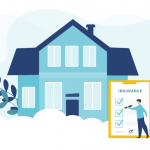Risky Business: How Can You Protect Your Home-Based Business?
April 1, 2022

With the rapid rise of the gig economy in recent years (and the spread of COVID-19), more and more Canadians are opting for self-employment. Why? For starters, it’s cheaper than renting a commercial space. Not to mention all the time you’ll save on commuting. And more importantly, you’ll have more freedom, flexibility, and creative control than ever before.

But whether it’s a passion project turned dream job or a small side-hustle to make some extra cash, running a business from the comfort of your own home has just as many risks as any other brick-and-mortar operation, especially if clients or employees are regularly stopping by. And unfortunately, your homeowners insurance won’t cover any work-related liabilities, like client injuries, stolen inventory, data loss, or any of the countless potential damages your business could encounter.
Without adequate protection, you’ll have to pay the expenses out-of-pocket. But could your business survive the loss? Could your income? To help you out, we’ve put together a list of the biggest risks your home-based business might face—and what you can do about it.
RELATED: 8 Frequently Asked Questions About Home-Based Businesses
1. A visitor is unexpectedly injured.
THE RISK:
If clients, vendors, or any other visitors are coming into your home for professional reasons—be it for routine services, a last minute accommodation, or just to pick up some files—your business could be liable for any injuries incurred. What if a courier slips on some wet leaves while dropping off a package? Or a client trips on their way to pick up an order? What if a customer shifts around during a haircut and you happen to scratch them? Even if they’re at fault, they could sue you for bodily harm since the accident occured on your property.
But location isn’t always a factor when it comes to injury. You can be sued as long as your business is involved, even if your property isn’t. Say you took a child from your home daycare to the park or you met up with a client at a cafe. If they got hurt, you’d be responsible for their legal and medical costs.
THE SOLUTION:
Commercial General Liability (CGL) Insurance will protect your business if it’s sued by a third-party for bodily injury, property damage, or reputational harm that’s caused by your professional activities or employee operations. That includes all services provided on your premises and anywhere else you and your staff conduct business, like a client’s office, worksite, or home.
Don’t interact with clients in-person? Even if your business is entirely virtual, CGL will still come in handy for any kind of third-party liability, such as:
- Property Damage: You spill coffee on a client’s couch during a meeting at their home.
- Personal and Advertising Injury: Your website publishes a photo that disregards copyright regulations. The artist becomes aware and files a lawsuit.
- Libel: Your company makes an online post comparing a product on your site to a competitor’s. The post contains false claims about your competitor, who then sues you for libel.
- Slander: A client overhears you talking about them in public to a friend and reports you for slander.
RELATED: All About Commercial General Liability Insurance: What is it, What’s Covered, and What’s Not?
2. A client claims you made a mistake.
THE RISK:
No matter how careful you are, mistakes happen, especially if you’re juggling multiple projects at the same time. But keep in mind: clients can be unpredictable and aggressive. And they can sue as long as they believe there’s been an error, even if you’ve done nothing wrong. What if you offer sound legal or HR advice, but a client faces a lawsuit anyway? What if you’re baking a wedding cake and it’s ruined on the day of?
But even if the claim has no merit, you’ll still have to defend. And the smaller your company is, the harder the recovery will be. With fewer resources in tow, home-based businesses are even more vulnerable to the damaging effects of drawn out litigation and legal fees.
THE SOLUTION:
Professional Liability Insurance defends you from allegations of errors, omissions, or negligence committed within the scope of your professional activities. That includes anything from failure to render services to breach of contract to poor advice and more.
Professional Liability Insurance is imperative for all working professionals and businesses. As long as you provide services to clients for a fee, you’re at risk of legal action, particularly if you offer medical, legal, or financial advice. But with a comprehensive Professional Liability Insurance policy, all of your damages—legal expenses, administrative costs, court settlements, and more—will be covered, even if the claims made against you are groundless.
RELATED: Professional Liability Insurance: What is it, What’s Covered, and What’s Not?
3. Your business inventory is damaged or stolen.
THE RISK:
A burglary, fire, flood, or other major disaster would be devastating for any homeowner. But if your home is also your place of work, it could be a bigger setback than you imagined. Think of everything you need to run your company. Your computer. Your custom-designs. Your files. Any specialized or expensive equipment. Raw materials or hard-to-find products. Items that you store, either for yourself or for your clients.
If it was all destroyed, could you afford to replace everything? If your valuable documents—notarized contracts, drawings, shares, bonds, legal papers, and more—were stolen, could you continue to conduct business? If you needed to close down for repairs, would your company withstand the downtime? Could you and your loved ones make it without the income? Getting back on your feet after a loss could take days, weeks, or even months, if you can reopen at all.
THE SOLUTION:
Don’t underestimate the value of your items. Even if you only have office basics, like a laptop, printer, and some furniture, the expenses can add up quickly. If you’ve got more than $5,000 in business-related items in your home, you should consider a Commercial Property Insurance policy with a high enough limit to replace all of your equipment and inventory.
With Commercial Property Insurance, you can protect your home-based business from damage and cover the cost of repairs or replacement for contents. Sure, you might not get your finished products or one-of-a-kind equipment back, at least you won’t have to start from scratch all over again. Some policies even come with special limits for business interruption to cover lost revenue and keep you financially afloat if you have to temporarily shut down. Others may have equipment breakdown coverage for damaged tools or machinery.
But don’t forget: in the same way your personal Home Insurance won’t cover your business activities, your Commercial Property Insurance won’t apply to your personal contents or possessions. It’ll only kick in for your commercial assets.
4. Your business suffers a privacy breach.
THE RISK:
Most businesses start out as a one-person show; resources are scarce and there’s not a lot of time or cash to go around. More often than not, you have to work with what you already have on-hand, like your personal devices, modems, and Wi-Fi routers.
However, unsecured connections are clear entry points for opportunistic cybercriminals to infiltrate your network and access confidential data. Hackers can also take advantage of security patches in the third-party software they know home-based businesses need to facilitate transactions, like online payment forms, video conferencing apps, and cloud service providers.
But in the event of a privacy breach, it’s not just the loss of data you have to worry about. Depending on the nature of the attack, your company may also have to pay regulatory fines, legal fees, and business disruption costs. Even worse? You won’t just lose your carefully curated design portfolios or your network of clients, you’ll lose their trust.
THE SOLUTION:
Although you might not see your business as a target, if you handle, transmit, or store clients’ personal information online in any way, you’re at risk. And if your business suffers a breach, your Professional Liability or CGL Insurance won’t cover you—they’re not specifically designed to address cyber threats. But a dedicated breach policy can help you protect your digital assets, offset your financial losses, and get your business back online in no time.
Data Security & Privacy Breach Insurance will cover a variety of your expenses following a privacy breach, cyberattack, or other security incident. Your plan may also include:
- Access to a forensic investigations team to help you determine the size and scope of the breach;
- A breach coach who will guide you through the legal process of navigating a breach under attorney-client privilege. The coach will tell you what to report and when;
- Funds to set up credit monitoring and notification for affected parties; and
- A team of public relations consultants to help manage your organization’s reputation;
- And more.
RELATED: All About Cyber Insurance: What is it, What’s Covered, and Why Do You Need it?
5. You use your personal vehicle for business purposes.
THE RISK:
Many home-based businesses rely on their owner’s or employees’ personally owned vehicles for work, whether that’s for visiting clients, transporting supplies, or even just for storage. However, if you’re running a business errand and you get into an at-fault accident, an injured party won’t just hold you liable, they could also hold your business liable.
And much like Home Insurance, your Auto Insurance probably won’t cover any business-related losses. While some auto policies might offer protection for limited business use, most won’t respond if the vehicle in question is owned by or registered to a business, especially if it’s larger than a pickup or used for deliveries. Additionally, your Auto Insurance won’t apply for any commercial products, equipment, or supplies that are damaged in an accident or stolen from your vehicle.
THE SOLUTION:
Commercial Auto Insurance will safeguard your business if a company-owned vehicle is involved in a collision, stolen, vandalized, or otherwise damaged. It’s critical for all vehicles that used for business—yours, your company’s, or your employees’—but specifically any vehicle that transports goods or passengers, including: company cars, buses, coaches, tow trucks, dump trucks, cargo trailers, delivery vehicles, food trucks, taxis and ubers, limos, and more.
In addition to vehicle damage, Commercial Auto Insurance can be designed to fit your business needs and offers coverage for: medical expenses and loss of income in case of an injury; loading and unloading liability for damage to cargo; and replacement vehicles as needed.
PRO Tips:
The right coverage for you will depend on your individual business—what you do, who you serve, how much you make, where you conduct business, if you have employees and how many, how much foot traffic you get, and more. In order to secure the best protection possible, be sure to:
1. Be transparent.
Whether you’re making $100 or $100,000, you shouldn’t hide your business from your insurance company. While you may be nervous about your premium skyrocketing, it’s better to pay a few extra dollars every month than to have your Home Insurance cancelled outright. That’s right, failure to disclose a home-based business could result in your homeowners policy being voided altogether.
2. Work with a broker.
Depending on your company operations, it might make more sense for you to add a couple of endorsements to your Home Insurance or purchase separate policies for all of your business needs. But you won’t know until you talk to your broker. A broker can help you review your existing homeowners policy for any work-related exclusions, understand your risks, and find the best deal for your needs and budget.
3. Keep your broker in the loop.
Your risks will change over time and it’s critical that your insurance reflects your evolving needs. Be sure to keep your broker in the know if you make any operational changes that could impact your insurance, like if your company expands, if you move locations, introduce a new service, or start shipping goods worldwide. This way, you can update the value of your business and ensure your policy limits match your needs.
RELATED: 8 Frequently Asked Questions About Home-Based Businesses
As a Business Owner, you know how tough it is to run a company. You’ve given up a lot-to see your business succeed. Time, energy, determination. Months, maybe even years, of your life. And if something were to go wrong, your financial security could collapse, especially if you rely on the income from your business to support your household.
And a lawsuit won’t just be time-consuming or costly—it could also jeopardize your relationship with your clients and destroy the trust you’ve worked so hard to build. Without a specific policy, you’ll be missing out on the key coverages you’ll need to truly shield your business and its assets from harm.
But every company is unique and the right policy won’t work for everyone. To protect your business comprehensively, you’ll need the help of a broker that understands the unique risks you face. With over 40 years of experience, we’ve seen it all. Whether you’re teaching piano a few times a week, selling vintage clothes on eBay, or hosting a podcast from your basement, PROLINK has the expertise to craft a plan for your specific needs.
To learn more, connect with PROLINK today!
PROLINK’s blog posts are general in nature. They do not take into account your personal objectives or financial situation and are not a substitute for professional advice. The specific terms of your policy will always apply. We bear no responsibility for the accuracy, legality, or timeliness of any external content.




